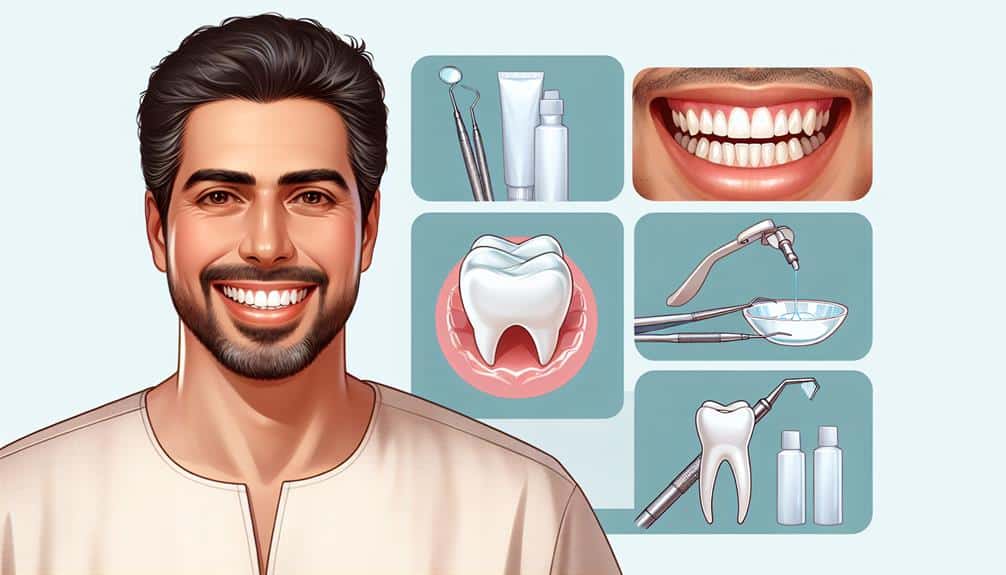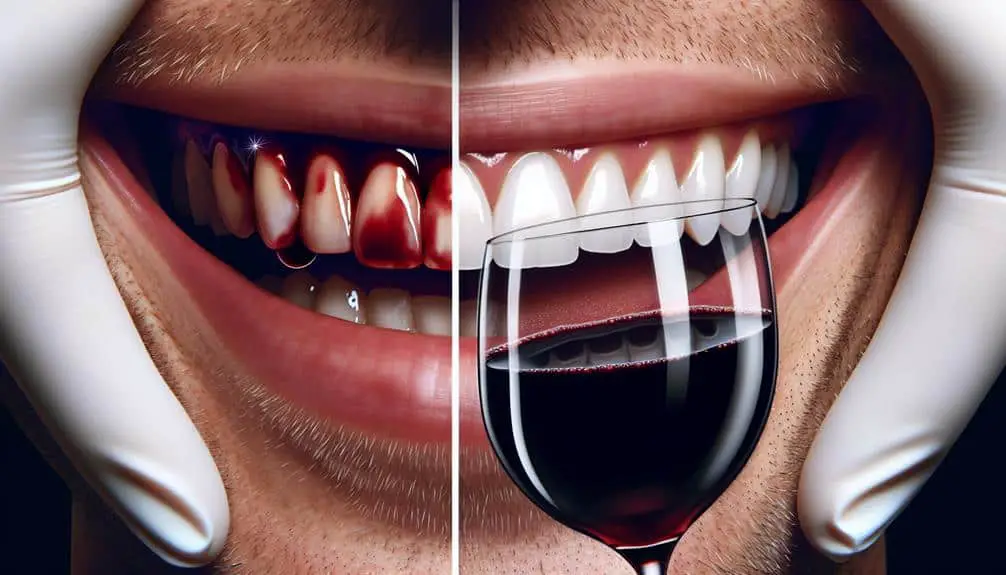To get rid of stains on your teeth, consider these seven best solutions: opt for professional whitening treatments for quick results under dental supervision. At-home whitening kits offer convenience for gradual brightening. Use whitening toothpaste with ingredients like hydrogen peroxide or baking soda. Cosmetic dental veneers can mask discoloration effectively with proper maintenance. Teeth whitening strips protect enamel and are easy to apply. Try natural remedies like baking soda or activated charcoal for a chemical-free approach. In-office laser whitening provides fast and safe treatment with long-lasting benefits. Revive your smile confidently with these effective solutions.
Key Points
- Professional whitening treatments offer dramatic and quick results with enamel restoration for lasting effects.
- At-home whitening solutions, like whitening trays and natural remedies, provide gradual and safe whitening benefits.
- Whitening toothpaste with hydrogen peroxide or baking soda effectively removes surface stains with proper brushing techniques.
- Cosmetic dental veneers effectively mask discoloration with long-term aesthetic benefits and regular maintenance.
- Teeth whitening strips with enamel protection and gentle formulas offer convenient application and minimal sensitivity.
Professional Whitening Treatments
For significant and immediate whitening results, consider opting for professional whitening treatments. Dental bleaching, a common procedure in professional whitening treatments, involves the use of bleaching agents to remove stains and discoloration from the teeth. These bleaching agents, such as hydrogen peroxide or carbamide peroxide, penetrate the enamel to break down the stains, resulting in a brighter smile. Enamel restoration is another key aspect of professional whitening treatments. The process helps strengthen and restore the enamel, which may have been reinforced by the bleaching agents or other factors.
Professional whitening treatments are often performed in a dentist's office, allowing for a more controlled and effective whitening process compared to over-the-counter products. Dentists can customize the treatment based on the individual's needs and make sure that the procedure is safe and effective. Additionally, professional whitening treatments can achieve more dramatic results in a shorter amount of time, making them a popular choice for individuals seeking quick and noticeable improvements in the brightness of their smile.
At-Home Whitening Kits
Consider exploring the option of using at-home whitening kits for a convenient and cost-effective approach to brightening your smile. DIY whitening trays are a significant choice among individuals seeking to whiten their teeth at home. These trays are often customizable to fit your teeth and can be used with whitening gels or strips for effective results. They provide a more tailored whitening experience compared to over-the-counter options.
Additionally, homemade whitening remedies, such as baking soda or hydrogen peroxide solutions, can be a natural and affordable way to whiten teeth at home. However, it's crucial to use these remedies cautiously to prevent damage to your enamel.
When using at-home whitening kits, it's important to follow the instructions carefully to achieve the desired results without harming your teeth. Consistency is key when using these kits, as gradual whitening over time is typically more effective and safer for your dental health. Before starting any whitening treatment, consulting with a dentist is advised to make sure it's suitable for your oral health needs.
Whitening Toothpaste
Whitening toothpaste can be a convenient and affordable way to help reduce surface stains on your teeth.
When choosing a whitening toothpaste, look for one that contains gentle abrasives and peroxide to effectively whiten your teeth without causing damage.
Benefits of Whitening Toothpaste
Using a whitening toothpaste can effectively help remove surface stains on your teeth, revealing a brighter smile. Toothpaste effectiveness is often attributed to ingredients like hydrogen peroxide or carbamide peroxide, which are common in whitening toothpaste.
When selecting a whitening toothpaste, comparing the ingredients can help you choose one that suits your needs best. To maximize the benefits, make sure you brush your teeth properly by using gentle circular motions and reaching all tooth surfaces.
Additionally, incorporating stain prevention techniques such as avoiding foods and drinks that stain teeth, like coffee or red wine, can further enhance the effectiveness of whitening toothpaste. By integrating these practices into your oral hygiene routine, you can achieve a whiter, brighter smile.
Choosing the Right Toothpaste
To select the best whitening toothpaste for your oral care routine, evaluate the ingredients carefully to make sure they align with your specific dental needs. When looking for a whitening toothpaste, consider ingredients like hydrogen peroxide, baking soda, fluoride, and silica, as they're known for their effectiveness in removing surface stains and brightening your smile.
Here are some toothpaste recommendations to help you choose wisely:
- Hydrogen peroxide: Helps to whiten teeth by breaking down stains.
- Baking soda: Acts as a gentle abrasive to scrub away surface stains.
- Fluoride: Strengthens enamel and helps prevent cavities while whitening.
- Silica: Helps to polish teeth gently for a brighter appearance.
Cosmetic Dental Veneers
One effective solution for stained teeth is through the application of cosmetic dental veneers, which are thin shells that are custom-made to cover the front surface of your teeth. Veneers can effectively mask discoloration that may not respond well to other whitening treatments. When considering veneers, it's important to note that maintenance is vital for their longevity. Proper care, such as regular brushing, flossing, and dental check-ups, can help guarantee the durability of your veneers.
In terms of cost, the price of veneers can vary depending on factors such as the material used, the expertise of the dentist, and the number of teeth being treated. On average, a single veneer can cost between $500 to $1500. While this initial investment may seem high, the aesthetic benefits and long-term durability of veneers make them a worthwhile option for individuals looking to improve the appearance of their smile. Consulting with a qualified dentist can provide more specific information regarding the cost and benefits of veneers tailored to your individual needs.
Teeth Whitening Strips
Teeth whitening strips are a popular at-home method for brightening your smile and reducing stains on your teeth. These strips offer convenience and easy application, making them a go-to choice for many individuals looking to enhance the whiteness of their teeth.
Here are some key points to keep in mind when using teeth whitening strips:
- Enamel Protection: Look for strips that mention enamel protection, as this indicates they've been designed with a focus on safeguarding your teeth's outer layer.
- Gentle Formula: Opt for strips with a gentle formula to minimize the risk of sensitivity or irritation while still effectively whitening your teeth.
- Convenience: Enjoy the flexibility of using whitening strips at any time that suits your schedule, whether at home or on the go.
- Easy Application: The straightforward application process of whitening strips makes it a hassle-free option for incorporating teeth whitening into your daily routine.
When choosing teeth whitening strips, prioritize those that offer enamel protection and a gentle formula for a safe and effective whitening experience.
Natural Teeth Whitening Remedies
Considering the increasing interest in natural oral care solutions, exploring alternative methods for brightening your smile can be beneficial.
When it comes to natural teeth whitening remedies, there are several DIY techniques you can try at home. Baking soda is a common household item that can be used to gently scrub away surface stains on your teeth. Its mild abrasiveness helps remove plaque and stains effectively.
Another popular natural remedy is activated charcoal, which is known for its ability to bind to toxins and stains on the teeth, helping to whiten them.
Oil pulling with coconut oil is an ancient technique that involves swishing oil around in your mouth to remove bacteria and promote oral health, potentially leading to a brighter smile.
Additionally, using hydrogen peroxide mixed with water as a mouthwash can also help whiten teeth naturally. These natural remedies offer a chemical-free way to enhance the brightness of your teeth without harsh ingredients found in commercial products.
In-Office Laser Whitening
Looking to achieve fast and effective results for your stained teeth?
In-office laser whitening offers professional supervision during treatment, ensuring a safe and controlled process.
Enjoy long-lasting whitening effects that can greatly enhance the appearance of your smile.
Fast and Effective Results
For those seeking fast and efficient improvement in tooth discoloration, consider the advantages of undergoing professional in-office laser whitening treatments. This advanced procedure offers instant results and long-lasting effects. Here are some key benefits:
- Immediate Brightening: Experience a visibly whiter smile in just one session.
- Targeted Treatment: Laser technology precisely targets stains, ensuring thorough whitening.
- Minimal Sensitivity: Compared to other methods, in-office laser whitening often causes less sensitivity.
- Professional Supervision: Trained dental professionals oversee the procedure, ensuring safety and best results.
In-office laser whitening is a top choice for individuals looking for quick and effective solutions to stained teeth with lasting benefits.
Professional Supervision During Treatment
During in-office laser whitening treatments, dental professionals closely oversee the procedure to guarantee safety and best results. Regular dental check-ups and progress monitoring are essential components of this process. Expert guidance is provided to make sure that the treatment is tailored to your specific needs and that any necessary adjustments are made promptly.
The supervision by trained professionals not only enhances the effectiveness of the whitening procedure but also helps in minimizing any potential risks or complications. This hands-on approach allows for real-time assessment of the whitening progress, enabling immediate modifications if required.
Trusting in the expertise of your dental team ensures that you receive top-notch care and achieve the desired outcomes from your in-office laser whitening treatment.
Long-Lasting Whitening Effects
To maintain the long-lasting whitening effects achieved through in-office laser treatments, diligent oral hygiene practices are essential. Consistent care will help preserve your radiant smile for an extended period. Here are some key tips to maintain your whitening results:
- Brush your teeth at least twice a day with a whitening toothpaste.
- Floss daily to remove plaque and prevent stains between teeth.
- Rinse with a whitening mouthwash to help maintain your bright smile.
- Visit your dentist regularly for professional cleanings and touch-ups.
Frequently Asked Questions
Are There Any Long-Term Side Effects of Undergoing Professional Whitening Treatments?
Long-term effects of professional whitening treatments can include increased tooth sensitivity and potential damage to tooth enamel. Safety concerns arise from excessive use of whitening products, leading to adverse effects on oral health.
Can At-Home Whitening Kits Be Used on Sensitive Teeth?
When dealing with sensitive teeth, managing sensitivity is essential for effective whitening. Make sure that at-home whitening kits are safe for tooth enamel. Prioritize whitening safety by consulting with a dental professional for personalized recommendations and guidance.
How Often Should Whitening Toothpaste Be Used to See Noticeable Results?
To achieve noticeable results using whitening toothpaste, you should use it consistently. Most brands recommend brushing twice daily for about 2 minutes each time. Results vary, but you may begin to see improvements after a few weeks of regular use.
Are There Any Risks Associated With Getting Cosmetic Dental Veneers for Teeth Whitening?
Dodging the risks of cosmetic dental veneers involves understanding key factors. Veneer durability can vary, impacting long-term cost. Alternatives like bonding exist, but maintenance is essential for veneer longevity. Consider all options wisely.
Do Teeth Whitening Strips Work Better for Certain Types of Stains Than Others?
Teeth whitening strips vary in effectiveness based on the type of stains. For coffee or wine stains, strips may work well. However, for deeper discoloration from smoking or aging, professional treatments might be more suitable.



